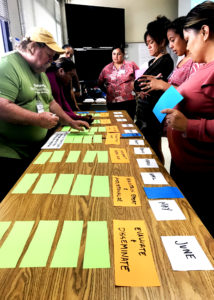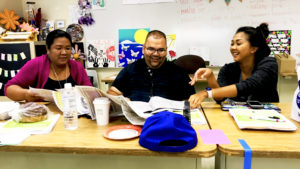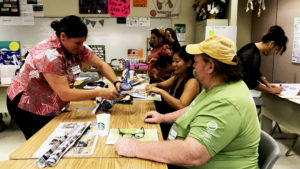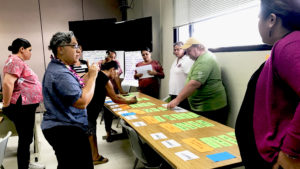People who work in alcohol and drug prevention often come with a deeply personal story. Someone they loved was injured or killed by a drunk driver. They witnessed – and/or were victims of – the rapid deterioration of family members who use. Perhaps they were themselves the users, and carry regrets with them like stones.
“Both Patty and I as facilitators show up as our authentic selves, sharing why we came to the work, why it’s important to us. I shared my own experience in having family members who are impacted by incarceration and addiction.”
This is Wendy. She is a Program Coordinator in yli’s Marin office. She spends most of her days working with young people, primarily youth of color, on racial justice issues in the county. She recently co-facilitated a training with Chief People Officer Patty Barahona for yli’s Training & Consulting Services (TCS), drawing on her direct experiences working with young people – as well as her own story – to share an evidenced-based model of underage substance prevention with communities all over the world.
The model, developed by Communities Mobilizing for Change on Alcohol (CMCA), provides a framework for creating community coalitions to address underage drinking. The model emphasizes authentic youth-adult partnerships, and strives for policy change that focuses on environmental prevention as opposed to punishing individual behavior.
This last part is key.
The 90’s-era DARE “just say no” mindset that focused on individual behaviors is still commonplace in prevention programs. This kind of thinking was established by the proponents of the sinister War on Drugs, which targeted – and then incarcerated on a massive scale – Black and Brown people across the country. And the evidence shows that it doesn’t work. Programs based on this model send home the message that young people who drink are “bad,” and rail away at the consequences with the goal of scaring youth away from drinking and drug use rather than looking at why – and how – they are using in the first place.
“Individual prevention really faults the individual, and that’s not a fair assessment of how we live in this world. We don’t exist in a vacuum. There are systems of oppression, there are powers that are out of our control that influence how we show up in this world, and that includes race, class, gender, our personal identities,” says Wendy.
The threat of punishment might succeed in turning some young people away from using, but, most often, these punishments simply perpetuate the cycles that lead to underage substance abuse.
 yli’s CMCA training program – which focuses on the environments that encourage risky behavior – is a paradigm-shift for many in prevention work. The training takes a step back from individual behaviors to look at what is happening at the community level. Wendy explains: “If there are high rates of substance use, is it because there are 5 liquor stores on our corner? Is it because there are 5 liquor stores within the 5 mile radius of our school? What’s happening in our community that makes alcohol that much more accessible for us to say ‘yes’? It’s about the policies that are in place. It’s about the messages that young people receive.”
yli’s CMCA training program – which focuses on the environments that encourage risky behavior – is a paradigm-shift for many in prevention work. The training takes a step back from individual behaviors to look at what is happening at the community level. Wendy explains: “If there are high rates of substance use, is it because there are 5 liquor stores on our corner? Is it because there are 5 liquor stores within the 5 mile radius of our school? What’s happening in our community that makes alcohol that much more accessible for us to say ‘yes’? It’s about the policies that are in place. It’s about the messages that young people receive.”
The concentration of these products in low-income communities of color is not a coincidence – and the various strategies the industry uses have been honed to target these communities in an effort to keep people drinking, and keep the industry’s profits growing.
The training not only shifts the focus to root causes, it also sets the stage for a cascade of positive outcomes that do far more than deter youth from substance abuse. Core to yli’s values is the active involvement of young people in assessing and addressing substance abuse in their communities. With policy change as its goal, the training:
- Offers a social justice lens on substance abuse within communities
- Provides the tools for youth to conduct community research, for example, examining the density of neighborhood liquor stores and advertisements, and gathering public opinion
- Trains youth to build campaigns, which includes researching similar policies, working alongside city council members, collaborating with community organizations, rallying community support, drafting recommendations, and giving testimony in city hall, among other key advocacy skills
The confidence, knowledge, and skills that young people gain through this program don’t just keep them out of trouble. They empower youth to advocate on behalf of their communities for a lifetime. What’s more, the policy changes they enact create positive changes that reduce substance abuse throughout their communities.
yli’s youth leaders are a stunning example of success in California, leading successful campaigns that have included:
- Amending Marin County’s Social Host Ordinance, a policy that holds adults responsible for underage drinking, to include a restorative justice approach for young people caught drinking
- Establishing Smoke-Free Parks in the City of Kerman
- Raising community awareness about drinking through the Sticker Shock Campaign media blitz in Fresno
- Reducing liquor and tobacco advertisements in San Francisco’s low-income communities of color through the Community Action Model
- Educating youth and their families throughout San Mateo County through a PhotoVoice project that visually illustrates the ill effects of substance abuse on communities
Together, these campaigns have touched thousands of lives – and developed a cadre of fearless, skilled youth leaders who are prepared to advocate on behalf of their communities for years to come. These are the on-the-ground experiences that Wendy draws on when facilitating CMCA trainings for community groups.
Spreading the Word about Environmental Prevention
Wendy’s last training took place at the beginning of August in Hilo, Hawaii. Organized by The County of Hawai’i Office of the Prosecuting Attorney, the training was attended by Community Policing Officers, members of community organizations like Big Island Substance Abuse Council, Life Choices, Coalition for Drug Free Hawaii, and Humble Beginnings, and administrative staff from Hawaii Community College and University of Hawaii. When Wendy introduced the CMCA model, it had the usual effect:
“Moving people away from thinking about ‘saying no to drugs’ to empowering young people to think about the options and choices that they have, and how those are influenced by forces that may be out of their control is eye-opening for folks. The goal of the training was to have participants think about environmental prevention as a lens to addressing youth substance use. To hear folks say, ‘I hadn’t thought about that – I can’t wait to take this back to my community,’ was a goal well achieved.”
Perhaps even more profound than shifting how people think about and approach their work is how the training changes how they think about themselves. Trainees are invited to reflect on their own lives, their own families and communities – and the personal stories that brought them to this work in the first place. For Wendy, the training helped her to come to terms with the challenging experiences and relationships she had with her parents:
“One of the comments that prompted me to share was, ‘Maybe it’s the parents’ fault. What are the parents doing and how are they involved in this situation?’ And that’s where I offered that my parents have also been impacted by addiction and incarceration. While there’s no justification for the harm that they might have caused to themselves, their family, and their community, as an adult, I’ve become a lot more compassionate to the circumstances in which they grew up and how that influenced the choices that they made. My mom was a victim of the War on Drugs that hit the streets of LA and I’ve witnessed the tremendous impact these racist and classist policies had on communities of color and women of color in particular. Settling in East LA also meant that my parents were raising their children in a community that is underfunded and under resourced but inundated with fast food restaurants and liquor stores on every corner. I cannot ignore the fact that our environment had a huge impact on the opportunities that my parents had.”
This shift in consciousness and growing compassion for one’s own circumstances is rich soil for advancing programming that is truly restorative and healing: “We definitely bring our personal stories to the work. The punitive ways that our parents treated us show up in our work. But there are other ways we can handle these situations – elevating youth, empowering them. We can change our mindset – we don’t have to do things the way we’ve done them for the past 10 years.”
Moving Forward
“Part of the training is not just saying these things, but providing examples of how to do it.”
The 2-day training took participants through concepts and skill-building to hands-on activities that would support the launch of the first coalition in the state to address the full array of substance abuse. This included working together to brainstorm a list of 100+ potential collaborators that participants could start contacting immediately after the training. The point, says Wendy is to show participants that they are not in this alone: “By working together, we’re already 10 steps ahead. There is already so much knowledge and power in this room – let’s just get to work and hit the ground running.”
The training also supports participants in assessing the current status of youth-adult partnerships, offering tools to avoid tokenization and create authentic opportunities for youth voice and engagement.
At the end of the training, participants were offered a packet of slides, activities, certificates of completion, and copies of the information and ideas they had developed over the course of the two days. yli facilitators follow up with calls to support implementation of the model.
Beyond the tremendous steps toward building a strong, forward-thinking coalition, this work was deeply personal, built fundamentally on the relationships that were created in the room: “We became an ‘Ohana’,” said one participant, “a family, after just two days.”



